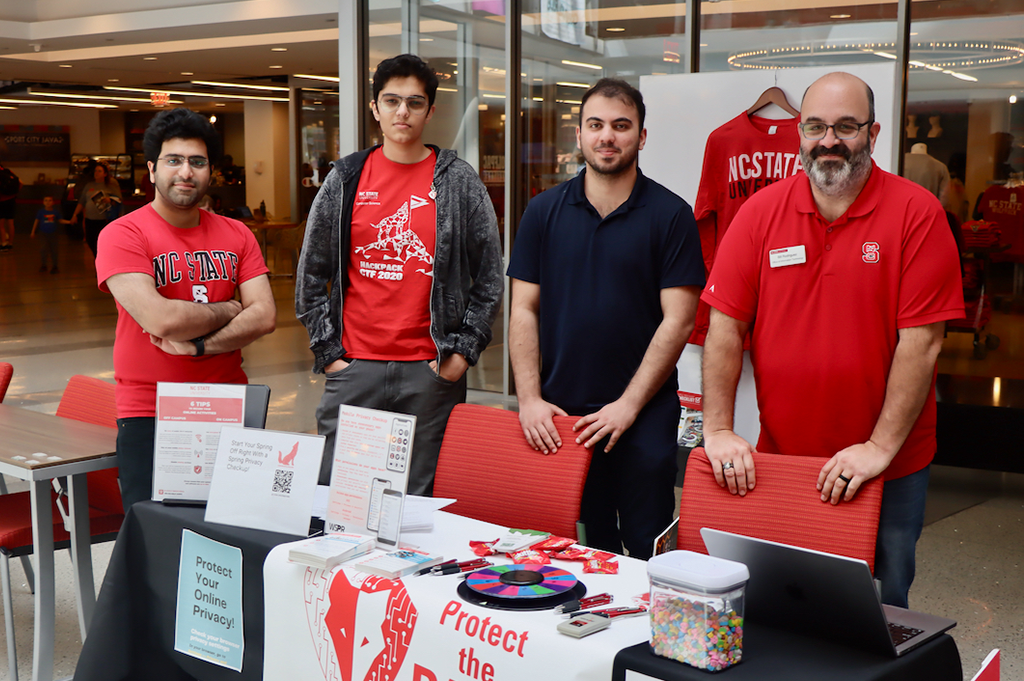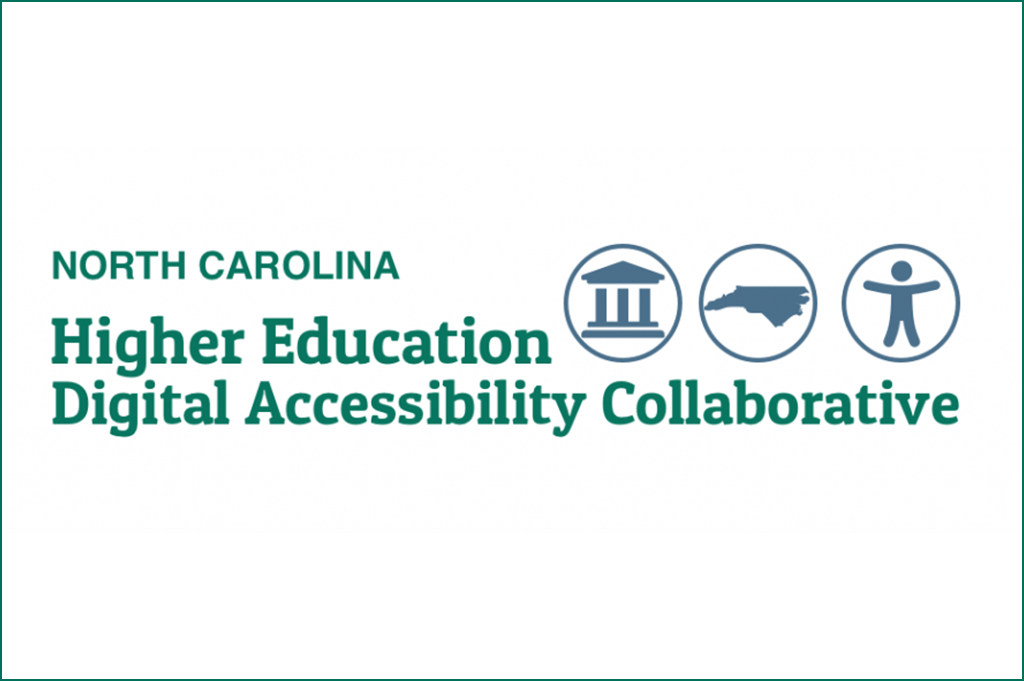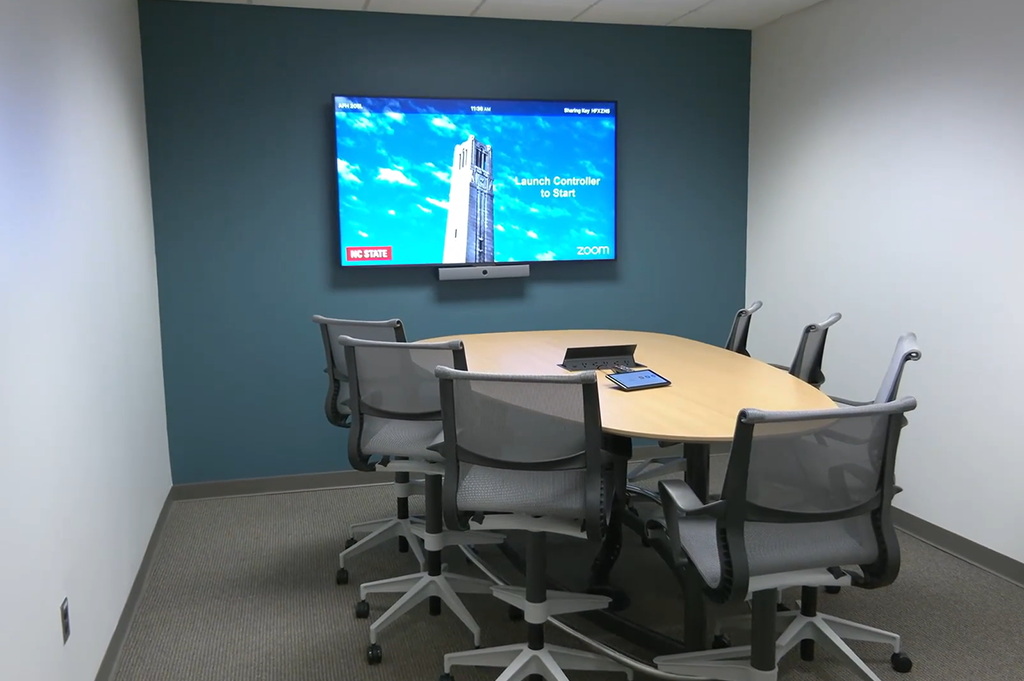
Strategic Goals
OIT supports the goals of the “Wolfpack 2030: Powering the Extraordinary” strategic plan through the following services:
Goal 1: Empower students for a lifetime of success and impact
- Grew the Project Management Lite (PML) Program to 46 interns from the NC State Poole College of Management, the Department of Computer Science, the College of Engineering and the Department of English. The PML provides students an opportunity to work on real projects alongside experienced professionals to build their strengths, talents and knowledge as well as to foster technological innovation at NC State. The PML interns have taken on the challenge of hybrid and remote work by creating new program processes to stay engaged. With the heightened awareness of students’ mental health, the student interns took advantage of resources offered by the university and focused on the team by creating venues to establish community and belonging. Seven interns graduated in May 2023.
- Developed the Pack Essentials application and approval process in the Student Information System (SIS) to streamline the process to assist students experiencing food, housing or financial insecurity.
- Developed Professional Teaching Licensure Tracking on a state-by-state basis to support College of Education students planning to seek licensure outside of North Carolina.
- Began efforts to enhance Academic Progress Reporting in SIS to support early academic intervention and begin the process to replace EAB with functionality in SIS.
- Enhanced the Graduate Student Support Plan to mitigate financial challenges often encountered by graduate students.
- Consolidated “home directory” space for students into a single, larger NC State Drive space available on Mac, Windows and Linux from previous separate AFS space on Linux.
- Continue to support student computing and application access needs via the NC State Virtual Computing Lab. Windows desktop use grew about 10% relative to the prior year.
- Supports 306 ClassTech spaces across campus, including 189 general-purpose (110) classrooms.
- Serviced via the Walk-In Center more than 4,000 students, providing 278 hardware repairs and 285 loaner laptops.
- Installed audience microphones in 20 ClassTech classrooms, greatly improving the student experience. This brings the total number of classrooms with audience microphones up to 79.
- Implemented single-line, digital phones in all ClassTech classrooms with one-button calling, which greatly improved the process used by faculty to request classroom support.
- Co-chairs the Active Learning Spaces Task Force and implements changes set by the Task Force.

Goal 2: Ensure preeminence in research, scholarship, innovation and collaboration
- Continued project management, network support and expanded Wi-Fi capacity for the Aerial Experimentation and Research Platform for Advanced Wireless or AERPAW project — a $24 million multi-year National Sciences Foundation grant to set up an advanced wireless platform for research. Shifted management of major operational activities to OIT.
- Conducted the AERPAW Community Workshop at NC State where more than 80 participants from all over the country participated. Led students through hands-on training to use the platform and conducted a demo of drone flying during this event.
- Continued support of the Plant Sciences Institute, including the USDA partnership, to ensure adequate IT infrastructure capabilities.
- Maintained NIST 800-171 compliant Secure University Research Environment (SURE) by completing four quarterly system security plan assessments conducted by OIT Security and Compliance.
- Completed an assessment of High-Performance Cluster Computing, including service strategy and service design activities. Delivered a recommendation for the College of Sciences to transition its high-performance computing (HPC) infrastructure to OIT and options for OIT to improve service delivery. Also delivered service requirements document with defined service level objectives for HPC services.
- Continued to maintain compliance with DFARS 252.204-7012 and NIST 800-171 to use Department of Defense Federal Contract Information and Controlled Unclassified Information in the SURE. Continued collaboration with the Office of Research and Innovation to conduct continuous monitoring of the SURE System Security Plan (SSP).
- Provided the university’s human-subject researchers with expertise and guidance in data management and data-security planning to assist them with the planning and execution of their Institutional Review Board (IRB)-approved research. Also supported IRB’s development of supplemental guidance for researchers’ use of software and applications.
- Automated the consultation requests via ServiceNow from researchers developing data security and management plans. The resultant process begins with researchers submitting a form that routes automatically to the ISRA team. This increased efficiency and enhanced customer service.
- Continued to provide subject-matter expertise to improve security for the Rapid Access Biosecurity Application (RABapp), a data-driven tool being developed by NC State. Supported the hiring of dedicated research support personnel and provided coordination of the research involved in migrating the RABapp tool to the cloud for scalability, security and future commercialization.
- Completed the majority of the effort needed to implement the Proposal Tracking and Post Award Management modules within the InfoEd RED System. The go-live date is in August 2023.
- Transitioned to new storage hardware to hold Research Storage data.
- Connected additional buildings at Lake Wheeler fiber locations and looking to expand connectivity at other research farms.
- Completing the project to update the campus internet connections to 100 gigabits per second.
- Continue to be a sponsor of the Regulated Research Community of Practice to address the requirements of regulated research for higher education institutions.

Goal 3: Expand and advance our engagement with and service to North Carolina and beyond, defining the standard for a 21st-century land-grant university
- Co-sponsored, in partnership with the North Carolina Higher Ed Digital Accessibility Collaborative, the “Join the Journey: 2023 Digital Accessibility Conference,” a professional development opportunity open to anyone in higher education in North Carolina. About 318 people attended the conference to learn about digital accessibility essentials.
- Will participate in the launch of the esports pilot space in the James B. Hunt Jr. Library in October 2023. The university continues to grow use cases and requirements for the mobile arena and has a contract to build the mobile “truck” by April 2024. A collegiate esports competition is being planned for May 2024 at Reynolds Coliseum.
- Continued to provide HPC service for UNC-Greensboro researchers. Initiating HPC service for UNC-Wilmingtion researchers.
- Leveraging the UNC System IT Vendor Risk Management (VRM) working group, NC State developed an IT VRM requirements and preferences document that was shared with multiple vendors and is working with the UNC System Office to test a pilot version of a new IT VRM solution that will start in the fiscal year 2023-24.
- Helped to lead the UNC Federal Trade Commission Safeguards Compliance Working Group that makes recommendations to the UNC Information Security Council.

Goal 4: Champion a culture of equity, diversity, inclusion, belonging and well-being in all we do
- Received the highest overall average in all core dimensions at NC State on the UNC System Employee Engagement Survey. Approximately 67% of the staff participated in the survey.
- Supported the OIT Diversity, Equity, Inclusion and Belonging (DEIB) team and subteams to discuss ways to improve the culture in OIT. Resources, speakers and events are made available for OIT staff to broaden their knowledge. The Lunch Buddies initiative continued to offer opportunities for staff to strengthen relationships across units, encourage further collaboration, and deepen understanding and connections with each other.
- Continued to provide sponsorship and assist in leading the Women in Technology interest group.
- Continued to provide grants to caption academic materials, ensuring all students, including those with hearing impairments, have full access to multimedia files.
- Conducted 158 reviews of IT services or applications to assess compliance with the university’s Digital Accessibility Regulation.
- Hosted the annual Web Accessibility Challenge, encouraging those responsible for campus websites to review and improve the accessibility of their sites, so all members of the university community can access technology, regardless of ability. The challenge resulted in a reduction in accessibility errors per page dropping from 3.66 to 1.89 and accessibility alerts on pages dropping from 20.01 to 10.93 per page.

Goal 5: Improve university effectiveness through transformative technologies, cutting-edge processes and actionable data
- Released “Digital Enablement: Powering the NC State Mission,” a strategic plan to lead IT innovation in support of the university’s mission and goals. Also beginning the implementation phase with a gap analysis of the IT strategic plan goals.
- Completed project in the Avent Ferry Technology Center to pilot new types of workspaces in support of hybrid work.
- Retired the optical mark reading (OMR) service and worked with Digitial Education and Learning Technology Applications (DELTA) to encourage dozens of faculty to transition to Gradescope for grading and potential learning management system integration.
- Retired the coax-based CATV service. Continuing to partner with University Housing as needed to support the streaming video service for residents.
- Upgraded more than 13,000 network ports across campus providing faster connectivity
- Continued the transition of life safety phone lines to VoIP. The work is expected to be completed this summer.
- Continued work on the third year of a five-year project to upgrade wireless bandwidth throughout campus.
- Extended campus network to Lake Wheeler Field Labs. The expected completion of the backbone and first three phases of buildings is this summer.
- Completed planning and began the upgrade of the entire campus network backbone. Work is expected to be completed in the fall of 2023.
- Reducing costs by replacing the Report2Web application by utilizing capabilities in other applications including PeopleSoft and OnBase.
- Reducing costs and operational support burden by retiring the AuriStor (AFS) file system. Increased NCSU Drive quota for all Unity accounts that provide more than the previous total of AFS and NCSU Drive space.
- Deployed new MCNC-hosted CrowdStrike client to OIT Shared Services-supported servers.
- Continued to add improvements to IT service monitoring service, including faster responses, certificate expiration tracking, external monitoring, SMS and text-to-voice notifications, ad-hoc notifications to IT support staff for service outages, and flexible on-call scheduling.
- Implemented governance retention lock on storage backup system along with security officer role to protect against data loss due to ransomware attacks.
- Resolved 4,829 Managed Desktop incident tickets. This has been the highest ticket count year on record since 2015.
- Worked with Align Financials to make several improvements to OIT’s Billing Application, which is hosted in ServiceNow; those improvements involved the user interface and simplified reporting; improved workflow for departmental administrators; Onboarding ServiceNow license billing; and Onboarding Hosted WordPress billing.
- Improved Knowledge Base articles, resulting in 61% of incidents being answered with existing knowledge articles.
- Assisted with two university initiatives: the Day of Giving and Early Voting.
- Provide 81 virtual desktops to EAS staff, eliminating the need for their desktops on campus and significantly improving business continuity for developers and DBAs. Also, piloting VMs in Advancement Services.
- Worked with the Poole College of Management to implement accounted printing services using PaperCut for faculty and staff of the college to eliminate the need for desktop printers and supplies. This is the only college at the university to make this transition.
- Collaborating with the Controller’s Office, attested 100% compliant with Payment Card Industry Data Security Standard (PCI DSS) for the fifth consecutive year with all three merchant types in March 2023. The University Dining merchant chain continues to attest as a Level 2 merchant. The university takes credit cards at 90 locations, yielding 1,450,000 transactions totaling about $117 million annually.
- Made sure that all users with access to ultra-sensitive data have Password Security Level Four (P4) to better secure sensitive data used at the college and central office level.
- Collaborated with University Controller’s Office, Human Resources and campuswide data stewards to more securely restrict the use of sensitive data by “no-pay” accounts. Controller approval is now required for “no-pay” account access to the Financial System.
- Issued 1,903 InCommon Certifications. Maintained public website keys that required secure transfer. Also maintained successful operations of programs and applications that required secure communications.
- Investigated 3,166 phishing reports generated from within ServiceNow and the Google Alert Center. This is a substantial increase of 835 from the previous year.
- Processed 436 Duo Fraudulent Report tickets to investigate potential account security concerns – a decrease of 101 tickets from the previous year.
- Disabled account credentials for 596 user accounts due to security concerns and compromised accounts.
- Resolved 2,822 licensing support tickets with an average resolution time of five and a half hours.
- Managed software licensing and maintenance contracts totaled $17,179,074 in addition to the $1 million SAS grant. Managed licensing partnerships with colleges and departments that totaled $1,264,279.
- Purchased new software and services in the amount of $573,327 for OIT to support the university mission while terminating phased-out software in the amount of $325,382; this resulted in a net increase of $247,945 for OIT licensing.
- Transitioned to a new Oracle licensing model to account for the College of Engineering student expansion; it is estimated to save the university $731,005 over five years.
- Reviewed 160 new clickwrap agreements for risks with an average resolution time of five hours and reviewed a total of 2,082 clickwraps since inception.
- Continued to enhance the IT Purchase Compliance (ITPC) process: Reviewed all IT purchases involving Purple data, Health Insurance Portability and Accountability Act (HIPAA), PCI or purchases that were subject to Export Control Regulations (regardless of cost); also reviewed all IT purchases having a cost of $5,000 or more. Conducted 285 reviews with an average time of 18.8 days to close tickets. Of the 285 submissions, 46.7% required accessibility reviews with an average close time of 14.9 days; 16.8% required security reviews with an average close time of 50.1 days; and 25.6% required email-integration reviews with an average close time of 1.3 days. Continuously reviewed ITPC for ongoing development and improvement to accommodate anticipated growth in demand, including the addition of a system architecture review for purchases that involve campus facilities, network infrastructure, operating systems and platforms.
- Developed and delivered a successful 2022 Cybersecurity Awareness Month (CSAM) in collaboration with Cybersecurity Awareness Team (CSAT) members, and partners. The theme was “It is Easy to Stay Safe Online.”
- Developed and delivered a successful 2023 Data Privacy Week in collaboration with CSAT members and partners.
- Worked with all stakeholders to remediate the issues identified in a 2019 internal audit of security controls associated with ultra-sensitive (Purple) data. As a result, the NC State Internal Audit Division successfully closed the March 26, 2019 audit report.
- Updated and prioritized the five-year NC State Cybersecurity Strategic Plan, recommending projects and resource requirements to secure university information systems and data per various rules, regulations, standards and laws. Also updated contractual obligations, including but not limited to ISO-27002, PCI DSS, Defense Federal Acquisition Regulation Supplement, National Institute of Standards and Technology (NIST) 800 series, Gramm–Leach–Bliley Act (GLBA), and HIPAA.
- Continuously improved the OIT change management process in ServiceNow and assisted other campus IT organizations (DELTA, CALS, etc.) with improving theirs. Implemented an expedited emergency change-approval policy to deliver faster turn-around times of change approvals — leading to real-time processing of change requests. Implemented a risk assessment feature to help with normalizing risk levels to be more consistent when classifying change requests. Increased the use of change management tasks in SN to better document the work of all stakeholders involved with implementing and testing each change request.
- Provided in-depth collaborative feedback to the IT Procurement Training team to produce the new IT Procurement Training Moodle Course and supplemental training guide. Provided training to campus in the fall of 2022.
- Continued the implementation of a Configuration Management Database (CMDB) with data inventory on IT resources. Moved discovery scans of campus assets into production via ServiceNow CMDB, where cloud-based solutions are imported from the IT Purchase Compliance database, and endpoint devices are imported from Jamf Pro for macOS devices and Microsoft Configuration Manager for Windows devices. Completed a pilot project with the Division of Academic and Student Affairs (DASA) in December 2022. DASA reviewed the discovered assets and classified them according to the university’s highest data classification level. Expanded CMDB availability from pilot phases to campuswide production deployment — launching the process for capturing IT resources throughout multi-user systems — with a campus-side target completion of December 2024, where all IT resources will be captured and classified.
- Delivered orientation to designated data stewards (regarding roles and responsibilities), connecting them with resources and partners to help them determine data-protection requirements from a risk-based approach.
- Delivered Users of Sensitive Data at NC State, an online training module for users who access ultra-sensitive (Purple) data. All existing users are required to complete this training as a one-time activity, and all new users will have to complete the training before being granted access via the SAR process. This is the first of many role-based training deliverables that will be offered to university employees to help them better meet NC State’s mission more securely.
- Worked with University Human Resources (UHR) to require the acknowledgment of the Information Security & Privacy Acknowledgement (ISPA) form annually and added a new feature for employees, supervisors or other stakeholders to view the last ISPA acknowledged date in Personal Details in the MyPack Portal. Also updated the language of the ISPA in collaboration with campus stakeholders.
- Continued developing the IT governance, risk and compliance (GRC) process. Determined that the purchased IT GRC tool required too many customizations to work and pivoted to define requirements more specifically and clearly. Developed a roadmap to pilot test possible solutions to meet the requirements. In the interim, Security and Compliance returned to a spreadsheet to manage compliance and risk management.
- Updated the Mandatory Data Security training with members of the Cybersecurity Awareness Team (CSAT) to address the current threat landscape. This included a pilot test to identify any issues before launch. As of May 2023, there is an 80% compliance rate from about 25,000 employees and affiliates. CSAT continues to find ways to increase the rate of compliance.
- Developed a CSAT Strategic Plan to strengthen cybersecurity awareness across campus and enable NC State to become an informed and proactive cyber community.
- Enhanced a campuswide IT risk management program in compliance with federal, state and the University of North Carolina System Office requirements. Began implementing prioritized recommendations from a consulting partner. Developed a new IT Risk Management Charter draft that will be shared with campus stakeholders before formally establishing the IT Risk Management Working Group.
- Conducted gap analysis along with roadmap guidance on how to meet NIST 800-171 compliance for the Peoplesoft Student Information System (SIS). OIT continues to work with stakeholders to evaluate the recommendations provided by a third-party assessor and prioritize remediation efforts.
- Began implementation of recommendations from a third-party partner that conducted a HIPAA security rule assessment for the university’s HIPAA-covered entities. The entities are centralizing their documentation efforts and establishing a standardized approach. They are auditing their inventory to determine if there are any missing Business Associate Agreements (BAAs) or to ensure their BAAs are up-to-date. Work continues to enhance the current HIPAA training.
- Completed 13 major portfolio projects, including network security monitoring; OnBase upgrade to v19, ultra-sensitive audit issues, UNC 1400.3 Gap Remediation Inventory Pilot, research DNS Firewall solutions, upgrade for all Oracle enterprise databases to Oracle 19c, change management phase III, service catalog development and Google search functionality; remediate Enterprise Applications Systems (EAS) to include 2FA; expand/replace Dev/Prod Exadata(s); research virtual desktop solution for EAS to use full time; change management phase IV; and government, risk and compliance enhancements,
- Worked with EMAS and the Provost’s Office to improve SACS Faculty Credentialing data and streamline the process for certifying faculty teaching credentials.
- In partnership with Institutional Strategy & Analysis (ISA) and campus representatives on the Enterprise Data Analytics and Warehousing Working Group (EDAWWG), developed an enterprise data warehouse and analytics strategic plan to enhance data-driven decision-making across campus.
- In partnership with the Office of Research and Innovation and University Human Resources and as a precursor to the implementation of a Guest & Affiliate System, implemented new UnPaid assignment classifications and security enhancements to provide heightened access controls for UnPaid appointees.
- Implement phase II of the Guest & Affiliate System to identify, register, provision and deprovision services for visitors.
- Continued the expansion of the OnBase imaging system in departments such as Environmental Health & Public Safety, the Provost’s Office, Student Conduct and the College of Agriculture and Life Sciences to reduce the dependence on paper.
- Implemented the Wolfpack Performance Program and the Remote Worker module within the Human Resources (HR) System to streamline performance management processes.
- Completed planning and testing for significantly enhanced disaster recovery processes for the HR System and infrastructure components required for payroll processing to demonstrably reduce the time needed for a full recovery and effectively eliminate the potential for data loss in the event of a disaster.
- Modified the HR System, the Oracle Identity Management System and Campus Community to source employee directory data from the HR System.
- Began the planning, analysis and documentation required to effectively scope the NIST/GLBA compliance initiative for the student system.
- Migrated all enterprise databases to new Exadata database appliances.
- Began the migration from Report2Web for enterprise online report distribution to OnBase as a cost-saving initiative.
- Implemented Data Guard for the Financial System to significantly improve disaster recovery capabilities.
- Upgrade and the managed desktop operating system to Windows 11.
- Implement Admin By Request to manage elevated privileges
- Start implementation of the Data warehouse for data efforts with ISA.
- Collaborated with the NC State University Emergency Management and Mission Continuity (EMMC) to develop a Business Impact Analysis (BIA) process. Piloted the BIA process with the Graduate School.
- In conjunction with EMMC, conducted two cybersecurity exercises with the College of Veterinary Medicine and the College of Engineering to test responses to various cybersecurity incidents.

Goal 6: Lead in developing innovative partnerships, entrepreneurial thinking and applied problem-solving
- Completed the move of the campus data centers to co-location space at the North Carolina Department of Information Technology (NC DIT) and MCNC.
- Continued partnership with the NC DIT and three UNC System universities to provide phone system support.
- Continued and strengthened collaboration with University Communications regarding www.ncsu.edu and other campus websites.
- Continued partnership with DELTA for the successful delivery of the capture service.
- Continued participation in the Classroom Technology Working Group, which allows for the exchange of information and ideas that impact all colleges and for the development of cross-campus relationships.
- Continue to expand the drone pilot training and partnership with the Federal Aviation Administration, health groups, the military and other organizations.

Goal 7: Elevate the national and global reputation and visibility of NC State
- Work with the Department of Agriculture on the Supercomputer project (SCINet node), an initiative to provide scientists with access to high-performance computing and high-speed networking to transfer data.
- Continue involvement with EDUCAUSE, the Southeastern Universities Research Association, the UNC System and other educational IT organizations to improve higher education partnerships.
- Earned second place in the Multi-State Information Sharing and Analysis Center Best of the Web Public Education Cybersecurity Website Award.